In 2019, long before SARS-CoV2 turned the world upside down, a group of 30 young professionals from across Europe came together to speak out in favour of immunisation. Together, they formed the Young Coalition for Prevention and Vaccination (YC4PV), coordinated by the Think Young think tank.
In late January, the Coalition published its Vaccination Manifesto at a meeting in the European Parliament. Then everything changed.
Here, in collaboration with Think Young, we present testimonials from six young professionals working in various parts of the healthcare sector. They explain how COVID-19 catapulted them into new ways of living and working, and reflect on what it means for public health.
Dr Luis Guedes, Public Health Official, Public Health Unit of Matosinhos, Portugal
This year the world turned upside down. This included our work as public health officials. Suddenly, our work focused on just one problem: COVID-19.
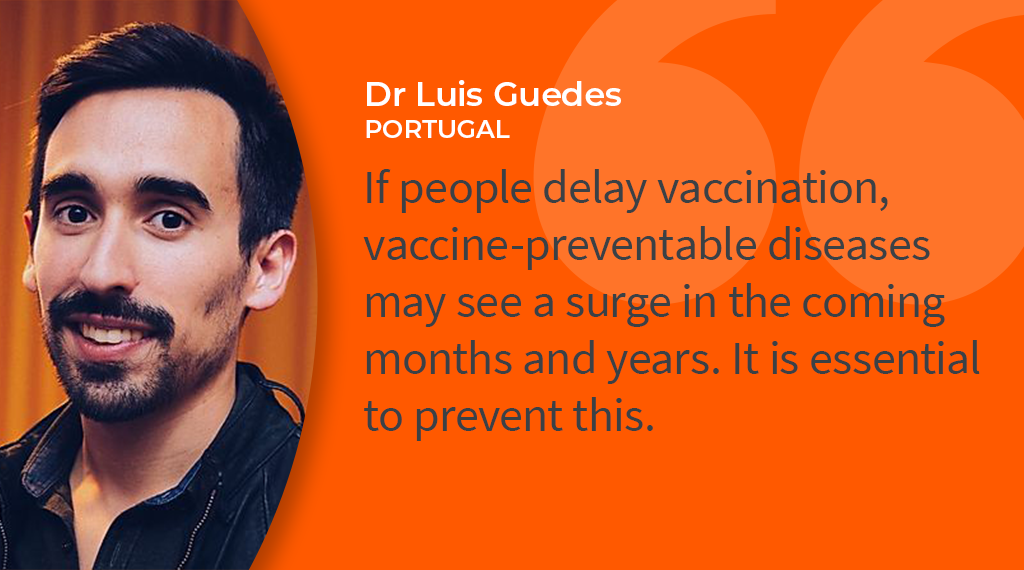
Our effort has been very intense and challenging, working overtime and weekends. From contact tracing, to screening people in nursing homes, to dealing with very complex situations (i.e. people who refuse to be tested), public health officials have been on the frontline, trying to contain the spread of this novel disease.
We feel the tension and the anxiety in the air: people in the community are scared and worried about this new threat. They care about themselves and their loved ones. They miss their friends and family. And there are very fragile people out there, who should be protected from this threat with our collective efforts.
As the world reopens, we will face new challenges. At the same time, we should look beyond COVID-19. Other diseases continue. Life goes on. There is a worry that, as people delay vaccination, vaccine-preventable diseases may see a surge in the upcoming months and years. It is essential to prevent this, to prevent further consequences from this pandemic.
Carlota Montes, Interning at Sanofi Pasteur Global Vaccines Public Affairs, Spain
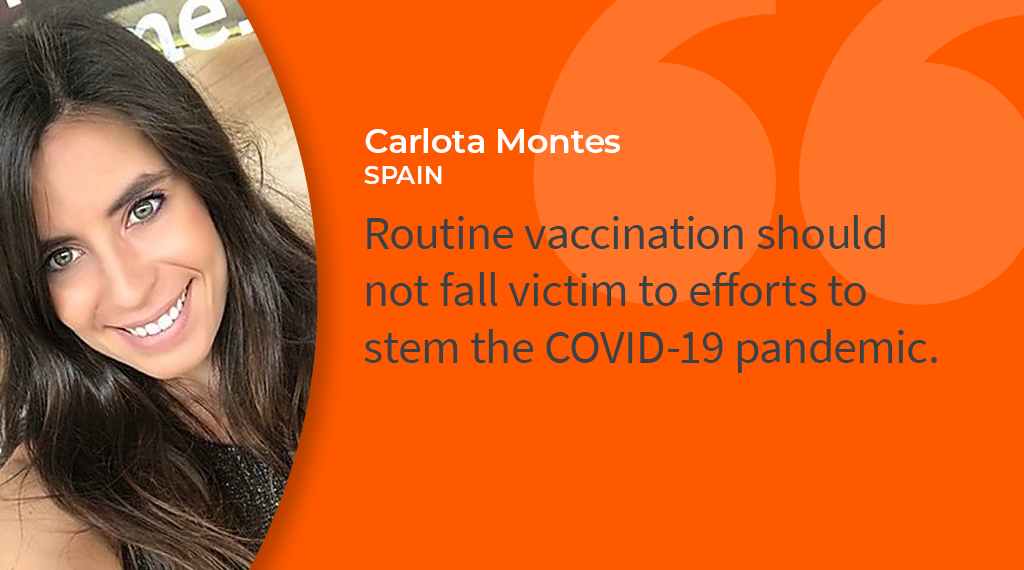
The COVID 19 pandemic is overstretching health services. Hence, now more than ever, the global health community must get ready for the complex challenge of repairing health systems including bridging the immunity gap resulting from disturbances to routine immunization. Routine vaccination should not fall victim to the efforts to stem the COVID-19 pandemic. Without an effective routine immunization, other infectious diseases may flourish, resulting in an increased burden on health systems which are already strained.
Dr Durdica Marosevic, Public health microbiologist and infectious disease epidemiologist, Bavarian Health and Food Safety Authority
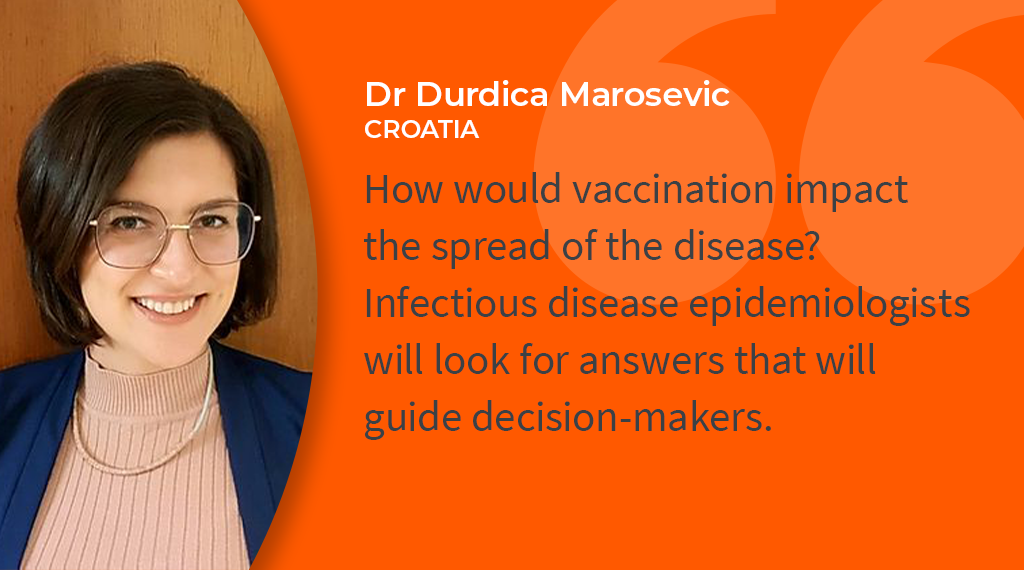
As infectious disease epidemiologists, we are now experiencing heightened interest in our job and opinions. Interest is coming both from our private network, but also from politicians, journalists and last but not least, from the scientific community. The latter covers questions my scientifically trained brain is the most comfortable answering.
My job encompasses collation of epidemiological data, interpretation and most importantly in the last few weeks, communication in an understandable, actionable way. I am not at the front line with patients who are in need of immediate help, but rather trying to answer public health related questions. Who is most affected? When to close shops? How to proceed with reopening of schools?
What to do if a hospital has a nursing shortage due to an outbreak within staff and patients? And when the time comes, and a vaccine is available – questions regarding immunity and impact of vaccinations on the spread of the disease. The answers to those questions are to be used as guiding poles for the community and decision makers. We are required to answer those questions in a timely manner, with limited resources and limited knowledge about the pathogen and considering possible limitations that our data or statistical analysis are bearing.
The main challenge for me is how to bring together the scientific carefulness and language I am accustomed to in scientific publications and the actionable clear-cut numbers and statements that the decision makers want and need in order to do their job. That is both a challenge, but also one of the reasons why I enjoy this job, because the impact our work has is tangible.
Chiara Delia, Global Regulatory Affairs Specialist, Chiesi Farmaceutici S.p.A, Italy
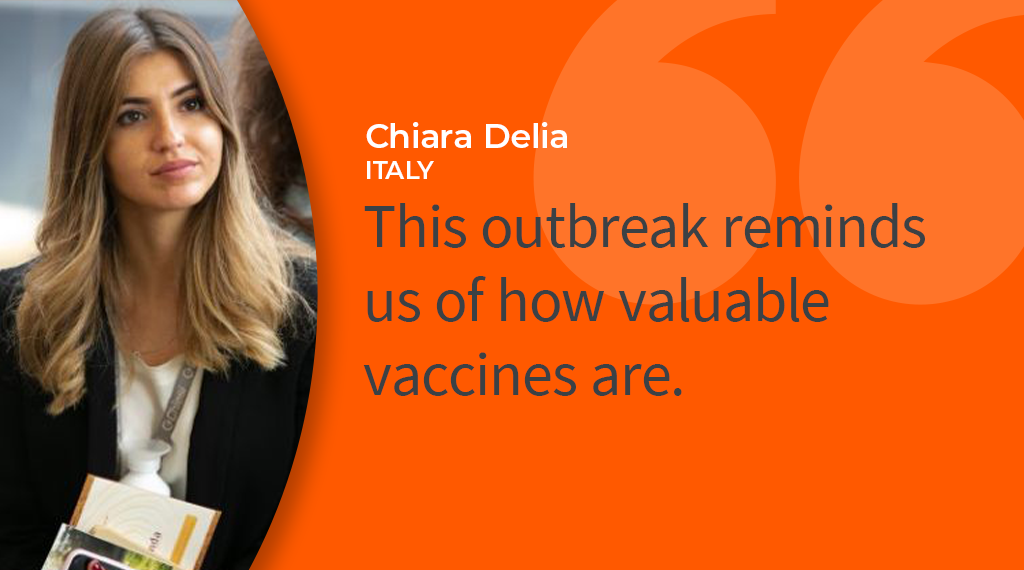
Italy has been on the front line of the coronavirus pandemic since it was the first European country to impose lockdown on its citizens.
We went through very difficult stages in just a few weeks: from the illusion that the virus did not concern us to the fear of direct infection; from the generalized emergency of viral diffusion to the response of social and even family distancing; from the shortage of masks to the use of mask like the seat belt; from the danger of even losing our life to the possibility of finding effective treatments and even the vaccine.
Basically, our daily life is turned upside down. People locked at home, everything closed: schools, bars, restaurants, cinemas, churches. Only supermarkets, pharmacies and other activities recognized as essential remain open. Go to the window to see nobody left on the street, while the sounds of the ambulance sirens are deafening. We see hospitals collapsing due to the number of hospitalized patients and even cemeteries no longer know where to bury the dead.
This outbreak reminds us of how valuable vaccines are. Europe is the most sceptic region in the world with regards to safety and effectiveness of vaccines. Just one year ago, when no one would have expected this catastrophic pandemic, the need for fresh voices in the conversation about immunization has led to the creation of the Young Coalition for Prevention and Vaccination (YC4PV).
As a member of the Coalition, I ask myself: is coronavirus changing minds about vaccine safety? A pandemic may be encouraging anti-vaxxers to change their minds, but, at the same time, the coronavirus outbreak is causing confusion, panic, and misinformation. The YC4PV is committed to provide evidence-based advice from facemasks to hand washing through an online campaign, spreading reliable information on vaccination.
There are no specific vaccines or treatments for COVID-19. Scientists around the world are working hard to develop a vaccine against the disease and pharmaceutical companies are joining forces. Innovative approaches to vaccine development are being used and this will be the fastest vaccine development and validation process in history.
In this respect, EMA has adapted its procedures in order to significantly shorten regulatory timelines for the review of new medicines and vaccines against COVID-19, so that marketing authorisations of safe, effective and high-quality COVID-19 related medicines can be granted as soon as possible. Mechanisms put in place by EMA include rapid scientific advice (reduced to a maximum of 20 days, compared to normally 40-70 days), through which developers can receive prompt guidance and direction on the best methods and study designs to generate robust data on how well a medicine or vaccine works, how safe it is, as well as on the manufacturing and control process to establish its quality. The total review time for a paediatric investigation plans (PIP) for COVID-19 products will be reduced to 20 days, compared to normally up to 120 days active review time.
As of now, each of us has a central role. We are all virus and vaccine together and we are responsible for our lives and that of others.
Dr. Mihai Negrea, Healthcare Management Specialist, Romanian Ministry of Health
2020 found me as a project coordinator in the World Bank Project “Healthcare Sector Reform” within the Ministry of Health of Romania. This gave me a place in the first row as the pandemic hit Romania and the world. The investment project I’m working on is strengthening Romania`s healthcare capacity in many areas: cancer treatment and prevention, emergency and intensive care unit capacity, burns treatment and so on.
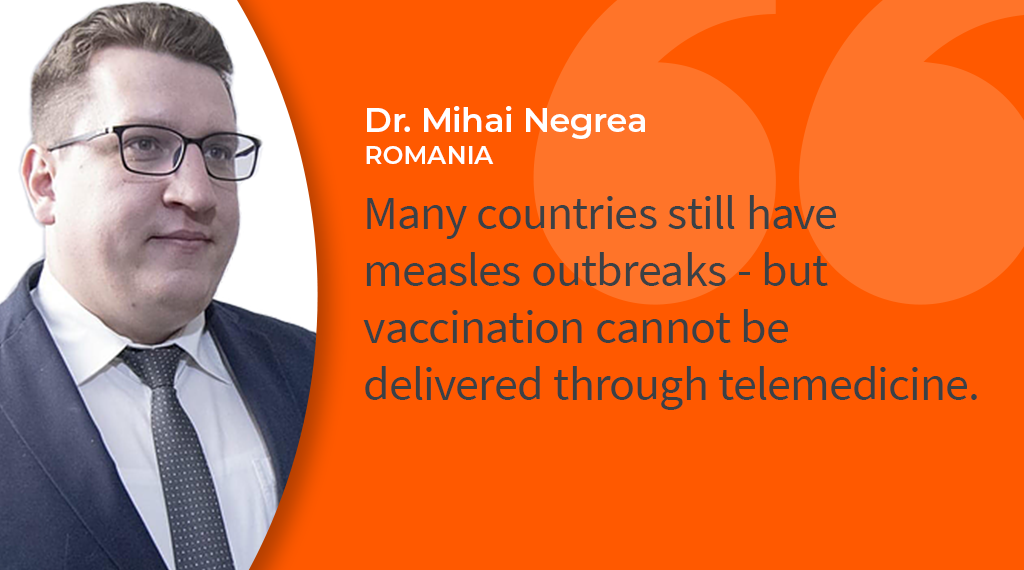
Although in Romania, the preparations for the COVID-19 epidemic started on 23 January, for most of us the experience started on 16 March when the state of emergency was declared. Everything else stopped and our whole society got involved in fighting this invisible enemy.
You may think you are prepared and you have everything under control but the reality is that no one is really prepared for all the implications that an pandemic has on society: social distancing, families split apart, restrictions that show you that something as insignificant as going for a walk is now impossible or very hard to do.
In the healthcare sector, we had lots of challenges, even if in terms of COVID-19 we have managed pretty well. We have had huge challenges in treating other patients affected by cancer or all kinds of emergencies. Moreover, in terms of prevention there were a lot of challenges in ensuring vaccination in terms of supply and access: transport was limited and was need to deal with COVID-19, doctor visits were also limited – and vaccination still cannot be done through telemedicine. Romania, like many other countries, still has a measles outbreak.
In conclusion, this crisis has shown us all that nobody is really prepared for a pandemic and global public health should be a priority activity for all policymakers.
Merle Böhmer, Infectious disease epidemiologist, Bavarian Health and Food Safety Authority, Germany
‘Definitely no new SARS’. That was my first response when a friend and colleague sent me the link to WHO’s statement on cases of pneumonia of unknown cause in China and asked me for my personal assessment of the situation. Oh, how wrong I was on that day in the very beginning of January 2020!
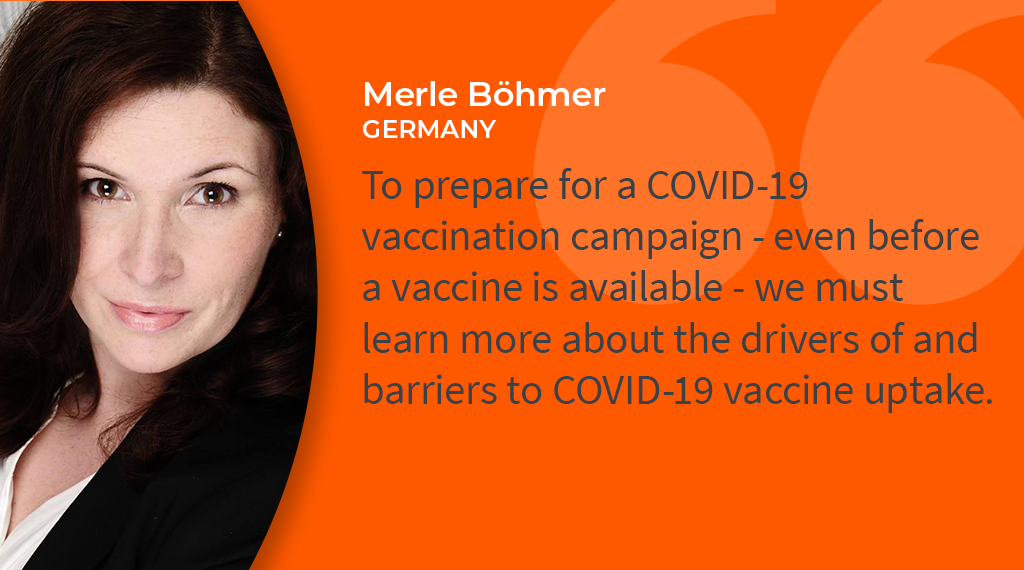
Since then the life of almost everyone including mine has changed due to the worldwide spread of COVID-19. By fear of the unknown disease. By the psychological challenges of curfew. By worries regarding the personal financial situation or the economy. By the uncertainty of the pandemic’s further progress. There may be many more.
From my professional viewpoint as an infectious disease epidemiologist, the last months have been the most challenging, exhausting but also interesting time of my life. It was our team that investigated the first outbreak of COVID-19 in Germany which also constituted the first human-to-human transmission of the novel coronavirus outside Asia. In the following I have been involved in the planning of several SARS-CoV-2 seroprevalence studies and a study on the clinical course and long-term health effects of COVID-19.
Though we have gained some knowledge regarding the virus and the disease it is causing during the last months, there are still many questions left to be answered. One of those that will be on my agenda next: How can we prepare a successful COVID-19 vaccination campaign even before there is an effective vaccine available? To address this question, you need to gather information on the vaccination intention within the population. How high is the proportion stating that they would get a COVID-19 vaccination? Are there differences among different population subgroups? Would parents get a vaccination for their children? What are the potential drivers of and barriers to COVID-19 vaccine uptake?



